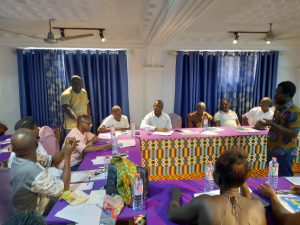
A Lecturer at the Department of Geography Education, University of Education, Winneba (UEW), has underscored that the strict adherence and application of the principles of Free Prior Informed Consent (FPIC) in Ghana’s food basket areas is crucial to food security.
FPIC, he explained, “is an iterative process, solicited through consultations in good faith with the representative institutions endorsed by communities.”
He said it is no secret that Ghana is food security-challenged, a reason he said has become necessary for the operationalisation of FPIC in particularly food basket communities of the country.
Dr. Asamoah made the call in a presentation christened: “Operationalising the Principles of FPIC for Food Security in Ghana’s Mining Communities,” at the opening of a three-day training workshop for locals and indigenous members of mining communities across the country in Tema, Greater Accra Region.
Organised by Wacam, in collaboration with its partners, OSIWA, the workshop aimed at promoting food security through the FPIC, and also coming out with recommendations for effective community participation in decisions relating to mining based on FPIC.
To operationalise FPIC in especially mining communities, which serve as the food baskets of the country, Dr. Asamoah spelt out some guiding principles.
According to him, if a project will affect the indigenous people in the community and food security, then FPIC becomes paramount, adding that this will not only protect properties of the locals but more importantly, lead to constant food production.
He said with FPIC in place, any activity on rural lands [food baskets] will respect the rights of indigenous dwellers, adding that this tool (FPIC) will ensure participation in any project in their communities.

Furthermore, he said FPIC as a tool for respecting rights of indigenous people must be upheld.
However, Dr. Asamoah pointed out that demonstration is not part of FPIC, but added that it could be used as a last resort and must be conducted as “peaceful as possible.”
He went on to touch on the four key elements of FPIC which he said are Free, Prior, Informed and Consent.
He explained that while the Free element allows stakeholders including community members in mining areas to determine the process, timeline and decision-making structure, Prior allows for enough time to understand, access, and analyse information on a proposed activity.
On the Informed component, he said information must be accessible, clear, consistent, accurate, constant, and transparent; and delivered in appropriate language, and stated that the Consent part takes care of a “freely given decision that may be a “Yes” or a “No,” including the option to reconsider if the proposed activities change or if new information relevant to the proposed activities emerges.”
Dr. Asamoah indicated that tenure and its governance were critical in determining individuals’ and communities’ rights to use and control land and other natural resources, adding that “if responsibly governed, leads to sustainable social and economic development.”
On the contrary, he cautioned that if land tenure is ill-regulated it could pose grave threats to food security, local livelihoods and sustainable natural resource management, and triggering land conflicts and human rights abuses.
Earlier, in a brief remark, the Executive Director of Wacam, Daniel Owusu-Koranteng, welcome the participants by admonishing them to always stand for the truth, stating that “you are despised when you are someone who always speaks the truth.”
The participants were grateful to Wacam and its partners for the training workshop, with many saying that they have become more educated and informed about the FPIC and especially how it can be applied to achieve food security in the country.

